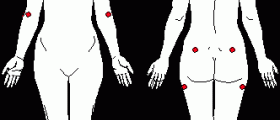
Fibromyalgia is considered one of the most common illnesses in women that affect muscles, tendons and joints. The disease features with long-term muscle soreness, stiffness as well as problems with sleep, mood changes and fatigue.
Even though fibromyalgia is still not recognized as a disorder by many doctors it is a serious issue causing a lot of disability. The illness cannot be confirmed with an X-ray examination, blood test or biopsy but there has been a significant improvement when it comes to diagnosing fibromyalgia thanks to the use of the thermograph, a device that measures the heat produced by certain parts of the body. In patients suffering from fibromyalgia there is a low blood flow and consequent decreased skin temperature of the tender sites.
Characteristics of Fibromyalgia in Women
Fibromyalgia causes permanent muscle soreness and the affected muscles are stiff. The person often complains about fatigue, anxiety, depression and mood changes. Some women additionally complain about memory loss and problems with concentration. The symptoms tend to become even worse if one is under stress and they may also aggravate due to weather changes.
People suffering from fibromyalgia tend to suffer from other illnesses too. For example, one of the most common disorders associated with fibromyalgia is temporomandibular joint disorder. Furthermore, fibromyalgia is also connected with chronic fatigue syndrome, tension headaches, migraines, irritable bowel syndrome and bladder syndromes. And finally, even though there is no direct connection between fibromyalgia and fibrocystic breast disease or endometriosis in women these conditions may occur together.
What Causes Fibromyalgia in Women?
The actual cause of fibromyalgia is not clear. Many experts are trying to determine the exact cause and they considered that the condition may be related to menopause. The reason for such assumption is that fibromyalgia generally affects women between the age of 40 and 55. Furthermore, some doctors assume that fibromyalgia may develop due to low thyroid function and drop in the level of thyroid hormones while some health professionals even investigate the hormone called cortical. The research regarding this peculiar condition continues and hopefully soon we will know more about the causes of fibromyalgia.
Treatment for Fibromyalgia
Unfortunately, there is neither cure for fibromyalgia nor the illness can be prevented. Hence the goal of the treatment is to alleviate symptoms. In many women doctors recommend physical therapy or light exercises. Depression associated with fibromyalgia is treated with tricyclic anti-depressants. In some cases patients are injected medications locally in order to alleviate muscle soreness and reduce stiffness. Muscles relaxants are another group of medications that may be beneficial in patients suffering from fibromyalgia. Additional help is obtained with dietary changes and some alternative treatments such as homeopathic remedies as well as intake of certain vitamin and mineral supplements.

















Your thoughts on this
Loading...